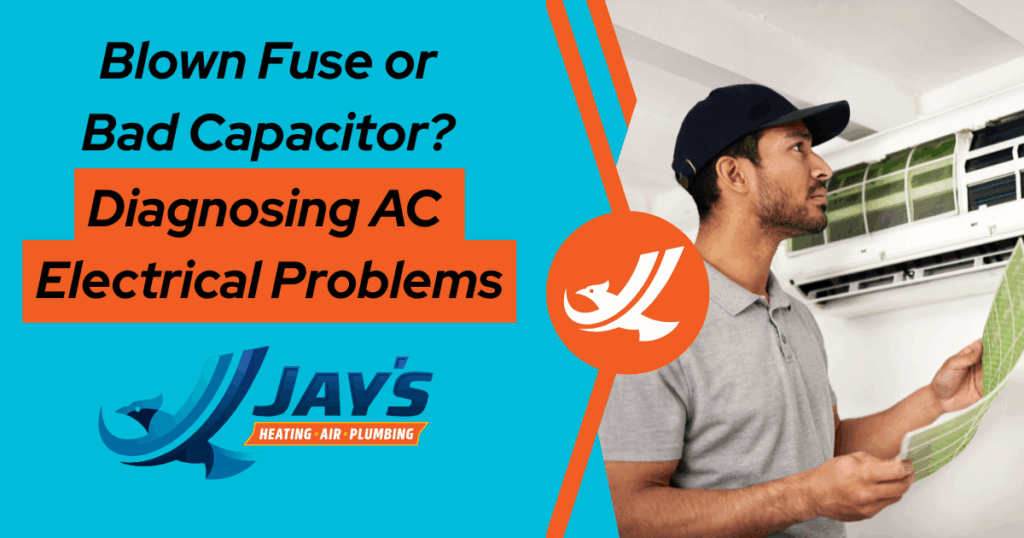
How do you tell if your AC capacitor is bad, or if it’s simply a blown fuse? This is a common question we receive as AC experts, so we’re breaking down the warning signs of each problem, the differences between them, and the importance of getting professional diagnoses and repairs to ensure safe, quality work.
AC Not Turning On? Here’s How Professional Diagnosis Saves You Time and Money
AC unit won’t start? This is a frustrating issue for any homeowner, especially if you can’t figure out why it’s happening. While it might be tempting to look up ‘why is my AC not turning on’ and start replacing parts until it works again, this usually just wastes time and money. Instead, we suggest relying on professional help. When you contact the pros at Jay’s, you get accurate, same-day diagnosis, faster repairs, and assurance that you’re avoiding damage to other AC components.
Why Your AC Might Suddenly Stop Working
Many things can lead to an AC shutdown, forcing you to shell out for emergency AC repair services. The most common causes are electrical issues. This could mean a problem with the thermostat, circuit breaker, or wiring, but it’s most common for the problem to stem from either a blown fuse or a bad capacitor.
Blown Fuse vs. Bad Capacitor: What’s the Difference?
Though these two issues can lead to the same problem, there are some important differences for homeowners to understand. To explain, let’s look at the role of fuses and capacitors in your AC system.
What is a fuse in an AC system?
An AC fuse is an electrical safety device that protects the electrical components in your condenser from being exposed to too much amperage. If too much power is sent to the condenser, the fuse will intentionally burn itself out, stopping the current from damaging the other (more expensive) components.
What is a capacitor, and what does it do?
An AC capacitor is a simple but important component that essentially stores a small amount of energy, which is then used to start the fan motor and compressor. It also regulates the amount of power entering these components, acting as a temporary battery to ensure a steady power supply. Unlike fuses, these aren’t designed to fail, but they can eventually become faulty due to age, prolonged heat exposure, or power surges.
Warning Signs of Each Problem
Now that we understand fuses and capacitors, let’s look at common signs of problems with each.
Symptoms of a blown AC fuse
There’s a good chance you’ll need to replace a blown AC fuse if you notice the following symptoms:
- The unit won’t turn on
- No response when you adjust the thermostat
- Frequently tripping breaker on the AC circuit
Symptoms of a bad AC capacitor
You may need AC capacitor replacement if you notice these symptoms:
- AC fan not spinning
- AC not working, but fan is running
- AC hums, but doesn’t start
- The compressor struggles to turn on
- AC cycles on and off rapidly
- AC won’t start
Can You Fix These Yourself? DIY vs. Pro Help
Working on high-voltage components like fuses and capacitors can be very dangerous without the right tools and knowledge. For your safety and to ensure a proper repair, it’s important to hire experienced, licensed experts to perform these repairs. Attempting to DIY electrical AC repairs puts you at risk of electric shock, fires, and other hazards.
Preventing Future AC Electrical Problems with Jay’s
Looking for AC repair near you? By contacting skilled professionals like the air conditioner repair techs at Jay’s, you get accurate system diagnoses, quality repairs, and peace of mind that your system is running at its very best. We offer fast response times, flexible financing, and a glowing reputation earned over our years of AC repair in Winston-Salem, NC.
Our seasonal AC maintenance services help you detect failing parts early, saving you time, money, and stress. We’ll repair components as needed, and can even add upgrades like surge protectors for even greater peace of mind.
Book a Diagnostic Visit Today
If you’re ready to solve the mystery of your malfunctioning AC, our team is here to help. We offer fast, accurate diagnosis and quality repairs. When you work with us, we simply fix the issue you asked for help with — no upsells or sudden price increases for the parts you need. Above all else, we offer peace of mind to homeowners like you. With free diagnostics with repairs, same-day service, and countless other benefits, we’re your go-to AC repair pros in Salem-Winston. Schedule a service appointment today!
Frequently Asked Questions
Why is my AC not turning on when I set the thermostat?
There are many possible reasons for an AC not running when the thermostat is set to cool. It could be issues with the thermostat, a dirty or damaged AC coil, a clogged air filter, or a tripped circuit breaker. An HVAC repair pro can pinpoint the source of the issue and fix it.
Why isn’t my outside AC unit running?
Issues with your AC’s outdoor condenser unit are often caused by power issues, such as a tripped circuit breaker or a bad capacitor. They may also be caused by a faulty motor, dirty filter, or another malfunctioning component.
What causes an AC to trip a circuit breaker or blow a fuse?
An AC will trip a breaker or blow a fuse if it’s pulling in more amps than the circuit is rated for. This can happen when the AC is running inefficiently due to dirty filters, damaged coils, or malfunctioning components.
How long does my landlord have to fix my AC?
In North Carolina, there is no specific timeline stating requirements for a landlord to fix your AC, only that it must happen in a ‘reasonable period’ after receiving a written notice from the tenant. This could be 24-72 hours for emergency shutdowns, or weeks for more minor issues.

